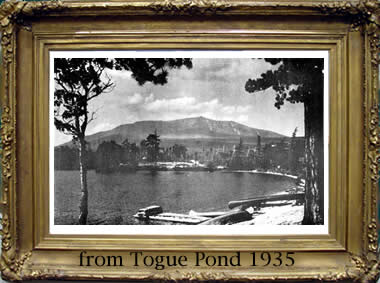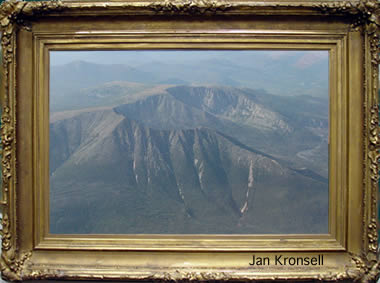

Help! In writing the song "Mt Katahdin",
the band TagYerit encountered a mystery.
The song is inspired by a quote that
is carved somewhere on the mountain but we don't know where. ... Do
you?
Also
- we'd love to add your photos or art work of Mt. Katahdin so they can be
rotated through the selections next to our lyrics.
Listen to Mt. Katahdin by TagYerit |
|
Mount Katahdin ©R&F NewmanMount Katahdin - hike her side |
|
| Here’s a hail to each flaming dawn Here’s a cheer to the night that’s gone May I go a-roamin’ on Until the day I die |
 |
| When I get stressed and feel not good It’s then I drag me into the woods It never fails to win my soul Despite the depths I’ve dug my hole As I clamber out - my insides shout Here’s a hail ... |
 |
| Here’s wishing that carver’s wish came true Hope we’ll be roaming right thru too And may we never break our stride And hike straight thru to the other side As I begin again - I want you with me friend |
 |
| Yeah, that’s us you’ll see in each flaming dawn We’ll be the moonlit night you saw - we’ll shimmer And may you keep on keeping on Until the day Until the day We watch you hike on by |
Contact us about sending your photos and quotes |
Several books say that the following poem is carved in a rock on Mt. Katahdin.
"Here's a hail to each flaming dawn
Here's a cheer to the night that's gone
May I go a-roamin' on
Until the day I die"
We wrote our song around this public uncredited poem. Only recently did we discover its origins. We have never seen this
rock, nor found any further information about this rock on or off the web. Of
course, Considering that MT. Katahdin is covered in thousands (millions?) of
rocks this may not be so surprising. If you have any knowledge of this carving,
please let us
know.
The mystery of the poem has finally been solved (1/3/2011). A friend was able to trace it to the original poem "A Rolling Stone" (1912) by Robert W. Service. The quote is also reportedly carved on a gravestone in the Adirondacks, so possibly it was a popular poem at one time. The only thing about finding the original poem that still stymies me, is why I failed at finding it sooner on my own searches. Still need to find out where the carving is/was?
At an elevation of 5,270 feet, Katahdin is the highest mountain in Maine. The Penobscot Indians, the native people of Maine, had named it Katahdin which means “The Greatest Mountain.” (Does this make 'Mount Katahdin' a redundant expression?) To them, Katahdin was the home of the storm god Pamola and so they avoided the area. The Penobscot Indian Nation is a tribe of the Wabanaki Confederacy (sometimes called Abanaki) of the northeastern United States.
In the 1840s, Henry David Thoreau climbed Mount Katahdin. His observations are recorded in a chapter in "Maine Woods". After climbing Mt. Katahdin Thoreau called for the creation of a national parks system: “Why should not we, who have renounced the king's authority, have our national preserves, where no villages need be destroyed, in which the bear and panther, and some even of the hunter race, may still exist, and not be civilized off the face of the earth.”
In his essay "The Poet," (1844) Ralph Waldo Emerson wrote: "Yet America is a poem in our eyes. Its ample geography dazzles the imagination." The beauty of North America has filled poets, writers and other artists with a need to create and share this experience. We hope the works we've assembled here will inspire you as well.
From 1930 to 1962, Percival B. Baxter, (governor of Maine 1921-1924) used his personal wealth to buy & donate 201,000 acres to the state of Maine with one condition: that it be kept forever wild. Known as Baxter State Park it includes Mount Katahdin.. ...Upon his death, Gov. Baxter left a trust of 7 million dollars to the park, with these words: "…shall forever be used for public park and recreational purposes, shall be forever left in the natural wild state, shall forever be kept as a sanctuary for wild beasts and birds, that no road or ways for motor vehicles shall hereafter ever be constructed ..." He also wrote the following:
"Man is born to die,
His works are short-lived.
Buildings crumble,
Monuments decay,
Wealth vanishes.
But Katahdin in all its glory,
Forever shall remain
The Mountain Of
The People of Maine."
Portions of Henry David Thoreau's Ktaadn passage from "The Maine Woods":"On the 31st of August, 1846, I left Concord in Massachusetts for Bangor and the backwoods of Maine, by way of the railroad and steamboat ... Ktaadn, whose name is an Indian word signifying highest land, was first ascended by white men in 1804.(Charles Turner). It was visited by Professor J. W. Bailey (professor of chemistry, mineralogy & geology) of West Point in 1836; by Dr. Charles T. Jackson, (R.W. Emerson's brother-in-law. Mt Jackson NH is named for him.) the State Geologist, in 1837; and by two young men from Boston (Edward E Hale & William F Channing) in 1845. All these have given accounts of their expeditions. ... very few, even among backwoodsmen and hunters, have ever climbed it, and it will be a long time before the tide of fashionable travel sets that way. ... some hours only of travel in this direction will carry the curious to the verge of a primitive forest, more interesting, perhaps, on all accounts, than they would reach by going a thousand miles westward. ... (Sept 8th) In the morning, after whetting our appetite on some raw pork, a wafer of hard bread, and a dipper of condensed cloud or waterspout, we all together began to make our way up the falls, .... But soon my companions were lost to my sight behind the mountain ridge in my rear, which still seemed ever retreating before me, and I climbed alone over huge rocks, loosely poised, a mile or more, still edging toward the clouds; for though the day was clear elsewhere, the summit was concealed by mist. The mountain seemed a vast aggregation of loose rocks, as if some time it had rained rocks, and they lay as they fell on the mountain sides, nowhere fairly at rest, but leaning on each other, all rocking-stones, with cavities between, but scarcely any soil or smoother shelf. They were the raw materials of a planet dropped from an unseen quarry, which the vast chemistry of nature would anon work up, or work down, into the smiling and verdant plains and valleys of earth. This was an undone extremity of the globe; as in lignite, we see coal in the process of formation. At length I entered within the skirts of the cloud which seemed forever drifting
over the summit, and yet would never be gone, but was generated out of that
pure air as fast as it flowed away; and when, a quarter of a mile farther, I
reached the summit of the ridge, which those who have seen in clearer weather
say is about five miles long, and contains a thousand acres of table-land, I
was deep within the hostile ranks of clouds, and all objects were obscured by
them. Now the wind would blow me out a yard of clear sunlight, wherein I stood;
then a gray, dawning light was all it could accomplish, the cloud-line ever
rising and falling with the wind's intensity. Sometimes it seemed as if the
summit would be cleared in a few moments, and smile in sunshine: but what was
gained on one side was lost on another. It was like sitting in a chimney and
waiting for the smoke to blow away. It was, in fact, a cloud-factory, —
these were the cloud-works, and the wind turned them off done from the cool,
bare rocks. Occasionally, when the windy columns broke in to me, I caught sight
of a dark, damp crag to the right or left; the mist driving ceaselessly between
it and me. It reminded me of the creations of the old epic and dramatic poets,
of Atlas, Vulcan, the Cyclops, and Prometheus. Such was Caucasus and the rock
where Prometheus was bound.Æschylus had no doubt visited such scenery
as this. It was vast, Titanic, and such as man never inhabits. Some part of
the beholder, even some vital part, seems to escape through the loose grating
of his ribs as he ascends. He is more lone than you can imagine. There is less
of substantial thought and fair understanding in him, than in the plains where
men inhabit. His reason is dispersed and shadowy, more thin and subtile, like
the air. Vast, Titanic, inhuman Nature has got him at disadvantage, caught him
alone, and pilfers him of some of his divine faculty. She does not smile on
him as in the plains. She seems to say sternly, why came ye here before your
time? This ground is not prepared for you. Is it not enough that I smile in
the valleys? I have never made this soil for thy feet, this air for thy breathing,
these rocks for thy neighbors. I cannot pity nor fondle thee here, but forever
relentlessly drive thee hence to where I am kind. Why seek me where I have not
called thee, and then complain because you find me but a stepmother? Shouldst
thou freeze or starve, or shudder thy life away, here is no shrine, nor altar,
nor any access to my ear. ... Perhaps I most fully realized that this was primeval, untamed, and forever
untameable Nature, or whatever else men call it, while coming down this part
of the mountain. We were passing over "Burnt Lands," burnt by lightning,
perchance, though they showed no recent marks of fire, hardly so much as a charred
stump, but looked rather like a natural pasture for the moose and deer, exceedingly
wild and desolate, with occasional strips of timber crossing them, and low poplars
springing up, and patches of blueberries here and there. I found myself traversing
them familiarly, like some pasture run to waste, or partially reclaimed by man;
but when I reflected what man, what brother or sister or kinsman of our race
made it and claimed it, I expected the proprietor to rise up and dispute my
passage. It is difficult to conceive of a region uninhabited by man. We habitually
presume his presence and influence everywhere. And yet we have not seen pure
Nature, unless we have seen her thus vast and dread and inhuman, though in the
midst of cities. Nature was here something savage and awful, though beautiful.
I looked with awe at the ground I trod on, to see what the Powers had made there,
the form and fashion and material of their work. This was that Earth of which
we have heard, made out of Chaos and Old Night.(Paradise Lost by John Milton)
Here was no man's garden, but the unhandselled globe. It was not lawn, nor pasture,
nor mead, nor woodland, nor lea, nor arable, nor waste-land. It was the fresh
and natural surface of the planet Earth, as it was made for ever and ever, —
to be the dwelling of man, we say, — so Nature made it, and man may use
it if he can. Man was not to be associated with it. It was Matter, vast, terrific,
— not his Mother Earth that we have heard of, not for him to tread on,
or be buried in, — no, it were being too familiar even to let his bones
lie there, — the home, this, of Necessity and Fate. There was there felt
the presence of a force not bound to be kind to man. It was a place for heathenism
and superstitious rites, — to be inhabited by men nearer of kin to the
rocks and to wild animals than we. We walked over it with a certain awe, stopping,
from time to time, to pick the blueberries which grew there, and had a smart
and spicy taste. Perchance where our wild pines stand, and leaves lie on their
forest floor, in Concord, there were once reapers, and husbandmen planted grain;
but here not even the surface had been scarred by man, but it was a specimen
of what God saw fit to make this world. What is it to be admitted to a museum,
to see a myriad of particular things, compared with being shown some star's
surface, some hard matter in its home! I stand in awe of my body, this matter
to which I am bound has become so strange to me. I fear not spirits, ghosts,
of which I am one, — that my body might, — but I fear bodies, I
tremble to meet them. What is this Titan that has possession of me? Talk of
mysteries! — Think of our life in nature, — daily to be shown matter,
to come in contact with it, — rocks, trees, wind on our cheeks! The solid
earth! the actual world! the common sense! Contact! Contact! Who are we? where
are we? |
A Description of Natardin or Catardin Mountain An extract from a letter written by Charles Turner who recorded the 1st climb in August 1804. " This Mountain is composed of Rocks, which appear to have broken or split. The rocks except at and near the top are of a coarse grain, of light grey colour, and most of them are crumbling, and of these crumbles the soil, if such it may be called, is composed. The Rocks near the top are of a finer contexture and of a bluish colour. The table land was formerly covered with wood of various kinds; with hard-woods near the streams where the soil was good; but with spruce in other parts, the trees lessening in height and ascended as we approached the mountain, untill they became dwarfs of only 2 feet in height, and finally came to nothing at about a half mile from the summit. The rocks and soil in the ascent were covered with a deep green moss. The table land and mountain on the South and East have been burnt over, and are entirely bare, except near the springs and streams. The ridge between the streams on the west seemed to have escaped the fire, and this circumstance enabled us to ascend with greater facility. ... The elevation was so great as sensibly to affect respiration. The day was very calm and sultry, and our toil so great, that when we had found several springs of very clear cold water, our company were inclined to drink of them too freely. Some felt the ill effects immediately, and others were taken to vomitting in the course of the night following; indeed our whole company, which consisted of eleven, found on the following morning, our throats sore and inflamed. Whether this arose wholly from some ill quality in the water, or partly from eating a variety of fruits, such as Raspberries, blue whortleberries, black currants, boxberries & bog cran-berries, which we found in abundance from the place where we left our boats to near the top, we could not determine. Though to us, in our thirsty and fatigued condition, the pure spring brought to our minds the fabled Nectar of the Poets, yet we found had that it (had)a very perceptible astringent quality, and appeared to impregnated with minerals. ... It is difficult by any orthography, precisely to express the name of this mountain, and convey to nasal sound which the Natives give. Ne-tar-dn or Ca-ta-din is as near perhaps as the powers of letters will admit. The Indians have a superstition respecting this Mountain, that an Evil Spirit, whom they call Pamola, inhabits it, at least in the Winter, and flies off in the Spring with tremendous rumbling noises. They have a tradition that no person i.e. native, who has attempted to ascend it, has lived to return. They alledge, that many moons ago, seven Indians resolutely ascended the mountain, and that they were never heard of afterwards, having been undoubtedly killed by Pamola in the mountain. The two Indians, whom we hired to pilot and assist us in ascending the mountain, cautioned us not to proceed if we should hear any uncommon noise; and when we came to the cold part of the mountain, they refused to proceed ahead however, when they found that we were determined to proceed, even without them, they again went forward courageously, and seemed ambitious to be first on the summit. ...." Scanned copy of the letter with complete text at the Maine Memory Network |
J. K. Laski, in the Bangor Courier, 1847, reprinted in The Maine Naturalist of June 1927 refers to "mirror broken into a thousand fragments, and wildly scattered over the grass, reflecting the full blaze of the sun.", which Thoreau cites in his "Maine Woods". Click to read the full text!!!Dr. Aaron Young led a botanical expedition in the fall of 1847. The reporter for the party was J.K. Laski a geologist, a member of the field team who wrote “Dr. Young’s Botanical Expedition to Mount Katahdin,” which was published in the Bangor Daily Whig and Courier, September 9, 1847. The newspaper account is signed by “one of the party,” but it has later been confirmed to be John Kimball de Laski (1814-1874), a doctor with an interest in geology. De Laski later published three papers in the American Journal of Science, one of which refers to his 1847 ascent of the mountain. The article has been reprinted with changes in The Maine Naturalist, VII, 2 (June 1927), pp. 38-62. In researching on the web, I also found a series of pages that discuss the events around Young's expedition in the Journal of The New England Botanical Club Vol. 37. January, 1935. No. 433. This article is hosted at Botanicus.org, but I found the article through a google search and wasn't able to find the front door, so I'm providing a series of links if you'd like to follow these pages in succession (I've skipped several insignificant pages) 1, 4, 5, 6, 7, 8, 9, 10, 11, 12, 13, 14, 15, 16, 17, 18, 19 This expedition was part of Young's attempt to create a study of the Flora of Maine " ... on August 18, 1847, at nine A. M., a party consisting of seven persons left Bangor for an exploration of Mount Katahdin. The party consisted of Dr. Aaron Young, Jr., in charge, aged 28 years; Dr. George Thurber of Providence, R. I., later noted as a botanist and horticultural editor, aged 26 years; Rev. Ariel Parrish Chute, a clergyman of Harrison, Maine, aged 38 years; Mr. J. K. Laski, later known as Dr. John De Laski, and a writer on the Glaciology of Penobscot Bay, then probably of Bangor, aged 32 years; John Emerson of Glenburn, Maine, a young man, George Emerson of Bangor, a youth, and James Cowan of Bangor, guide. |
The Lumberman Wildly round our woodland quarters, |
To A Pine-Tree Far up on Katahdin thou towerest |
ABOUT THE PICTURES USED HERE:
All have been used by permission or are in Public Domain. To the best of our
abilities, the original sources can be found in the Links section
The Athenaeum
- user contributed Art History resource designed for studying the humanities.
Wikimedia
- a great resource for finding public domain pictures
Contact me if you'd like to swap links or have a link you believe would be relevant to this site. I may also consider paid links, as long as they add value to the visitor's experience.